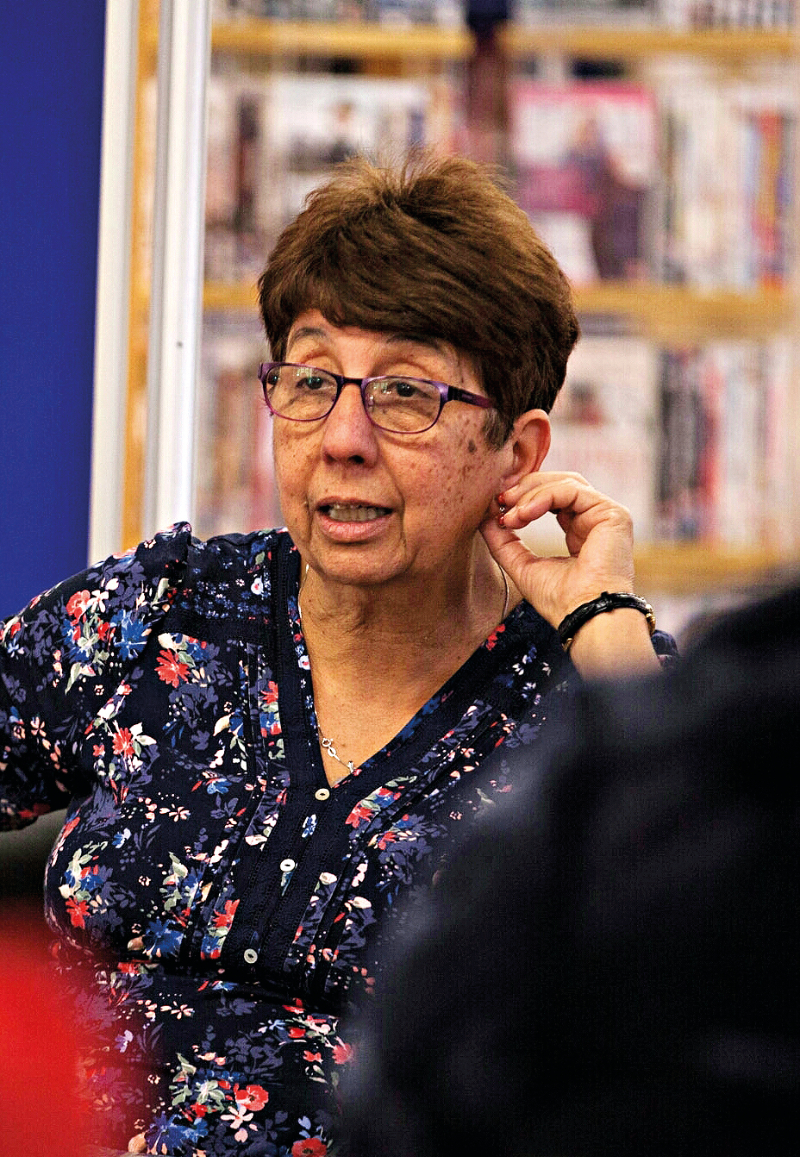Who are your children talking to? Book explores dangers of online grooming
Author Miriam Halahmy speaks to Alex Galbinski about her new title for young adults, 'Always Here For You'
My nearly 13-year-old couldn’t put down Miriam Halahmy’s new book for young adults, Always Here For You. The novel tackles the difficult subject of online grooming in a sensitive yet informative way – and includes a mainstream Jewish character.
Holly is 14 and lonely. Her best friend, Amy, has moved abroad and she doesn’t have many friends at school. Her parents are either at work or dealing with family crises, so she’s often home alone and feeling sorry for herself – that is until she finds Jay.
He’s caring and funny and they seem to have so much in common. Holly finds herself chatting to him online for hours, even when she should be asleep. He’s the only one who understands her, she thinks, and when he starts telling her to ignore her parents (with whom she’s rowing), Amy, and some new friends she’s making at school, she knows he’s only saying that to protect her. So when he wants to meet Holly face-to-face, why shouldn’t she agree?
Get The Jewish News Daily Edition by email and never miss our top stories Free Sign Up
Halahmy was inspired to write the book, which was launched on Safer Internet Day earlier this month, after being deeply affected by two real-life stories she read about.
One concerned a girl aged 15, who was groomed by two men via Facebook, and the other a 14-year-old boy, who was groomed by a boy four years older than him on a gaming app.
Both teenagers were from “good” homes but, tragically, were killed by their groomers.
“I was heartbroken learning about these children and I wanted to write a book to show how it happens. I wanted to write it as a warning,” Halahmy recalls.
“My message is not to frighten young people, but to empower them – to take back control so they decide who they are going to meet. The mobile phone, which we all have, is creating an addiction in adults and children, and I have to fight it as much as everyone else.”
The author of 10 books – including a 19th century young adult (YA) novel she has just completed – wants children to think twice about offering up personal details to people online.
“They wouldn’t go up to a strange man in the street and talk to him, so why would you trust a strange man on the internet or give him your photo?
“Even if someone is recommended by a friend, you have to remain wary. Young people must learn the permanence of the internet and that once things are on there, they can be shared.”
Holly is quite naïve for 14; she’s not a knowing child, and her parents have taken their eye off the ball, Halahmy explains. “She has loving parents and they have provided for her, and I wanted to show that this can happen to anyone – and it happens very quickly. Holly is so gullible and Jay is clever.”

While Halahmy has previously written about the Second World War, she felt it increasingly important to include in the novel what she calls a “mainstream” Jewish character in the form of Noah, Holly’s classmate and, later, friend. She helps him when he is in a difficult situation and he returns the favour.
“I wrote him in not for the non-Jewish children, but for Jewish ones,” Halahmy explains. “Inclusivity is about every type of person being able to see themselves in literature. It has become apparent to us Jewish authors in the UK that Jewish characters don’t appear in YA literature unless they are dying in the Holocaust.
“Noah is part of the crowd and is identifiably Jewish, but this is not the only thing that defines him.”
Noah has a legitimate storyline of his own. He is part of a large and noisy but caring family and belongs to a progressive synagogue. He references his own barmitzvah, which he takes extremely seriously, and talks about the upcoming speech he’s delivering at his cousin’s.
“As an author, you’ve got to decide what you’re going to put in that’s overtly Jewish. Rick, who bullies Noah, is also Jewish – they know each other from synagogue, and I wanted to show that synagogues are a normal part of their lives.”
It was also important to Halahmy to accurately portray the process of online grooming. She read case studies and transcripts of online chats, spent time online, and looked to her husband, Raphael, and one of his colleagues, both of whom chair child protection committees, as her sounding boards.
The Alyth Synagogue member also enlisted the help of a team at the National Society for the Prevention of Cruelty To Children. “I tested out my theories as to how Holly met Jay and how it developed,” says Halahmy, who lives in Golders Green.

“Jay uses a form of blackmail – he tries to manipulate Holly. Groomers put on a sulk, so the girls become even more compliant because they think they are in love. Jay has been softening her up with the pictures she sent him of her in a bikini.”
The author, who is in her sixties, also held focus groups with 13-year-old schoolgirls, who put her straight as to teenage habits. “Would this happen over Facebook, I asked them? No, they told me – Facebook is for older people!”
Halahmy was shocked to learn that some children agree to meet their groomer the very next day. Some, like the character of Holly – and the girl who was killed in the real-life scenario – exchange around 2,000 messages with their groomer over a two-week period.
Halahmy’s message to readers is to keep their wits about them and check out people as much as they can. “I hope this will raise antennae as to who pops up on your phone and to keep an eye on your friends,” she says.
“If your friend is changing and withdrawing and always on their phone, maybe you need to ask who they are talking to. The ages of 10 to 14 are very vulnerable.
“The book is also about learning what friendship is. You can turn up your nose at people, but then you find out who your real friends are.”
- Always Here For You by Miriam Halahmy is published by ZunTold, priced £8.99 (paperback)

Thank you for helping to make Jewish News the leading source of news and opinion for the UK Jewish community. Today we're asking for your invaluable help to continue putting our community first in everything we do.
For as little as £5 a month you can help sustain the vital work we do in celebrating and standing up for Jewish life in Britain.
Jewish News holds our community together and keeps us connected. Like a synagogue, it’s where people turn to feel part of something bigger. It also proudly shows the rest of Britain the vibrancy and rich culture of modern Jewish life.
You can make a quick and easy one-off or monthly contribution of £5, £10, £20 or any other sum you’re comfortable with.
100% of your donation will help us continue celebrating our community, in all its dynamic diversity...
Engaging
Being a community platform means so much more than producing a newspaper and website. One of our proudest roles is media partnering with our invaluable charities to amplify the outstanding work they do to help us all.
Celebrating
There’s no shortage of oys in the world but Jewish News takes every opportunity to celebrate the joys too, through projects like Night of Heroes, 40 Under 40 and other compelling countdowns that make the community kvell with pride.
Pioneering
In the first collaboration between media outlets from different faiths, Jewish News worked with British Muslim TV and Church Times to produce a list of young activists leading the way on interfaith understanding.
Campaigning
Royal Mail issued a stamp honouring Holocaust hero Sir Nicholas Winton after a Jewish News campaign attracted more than 100,000 backers. Jewish Newsalso produces special editions of the paper highlighting pressing issues including mental health and Holocaust remembrance.
Easy access
In an age when news is readily accessible, Jewish News provides high-quality content free online and offline, removing any financial barriers to connecting people.
Voice of our community to wider society
The Jewish News team regularly appears on TV, radio and on the pages of the national press to comment on stories about the Jewish community. Easy access to the paper on the streets of London also means Jewish News provides an invaluable window into the community for the country at large.
We hope you agree all this is worth preserving.
-
By Brigit Grant
-
By Laurent Vaughan - Senior Associate (Bishop & Sewell Solicitors)
-
By Laurent Vaughan - Senior Associate (Bishop & Sewell Solicitors)
-
By Laurent Vaughan - Senior Associate (Bishop & Sewell Solicitors)
-
By Laurent Vaughan - Senior Associate (Bishop & Sewell Solicitors)






















